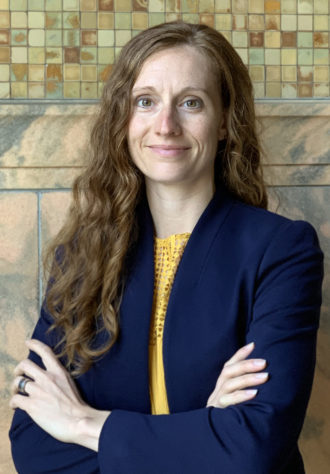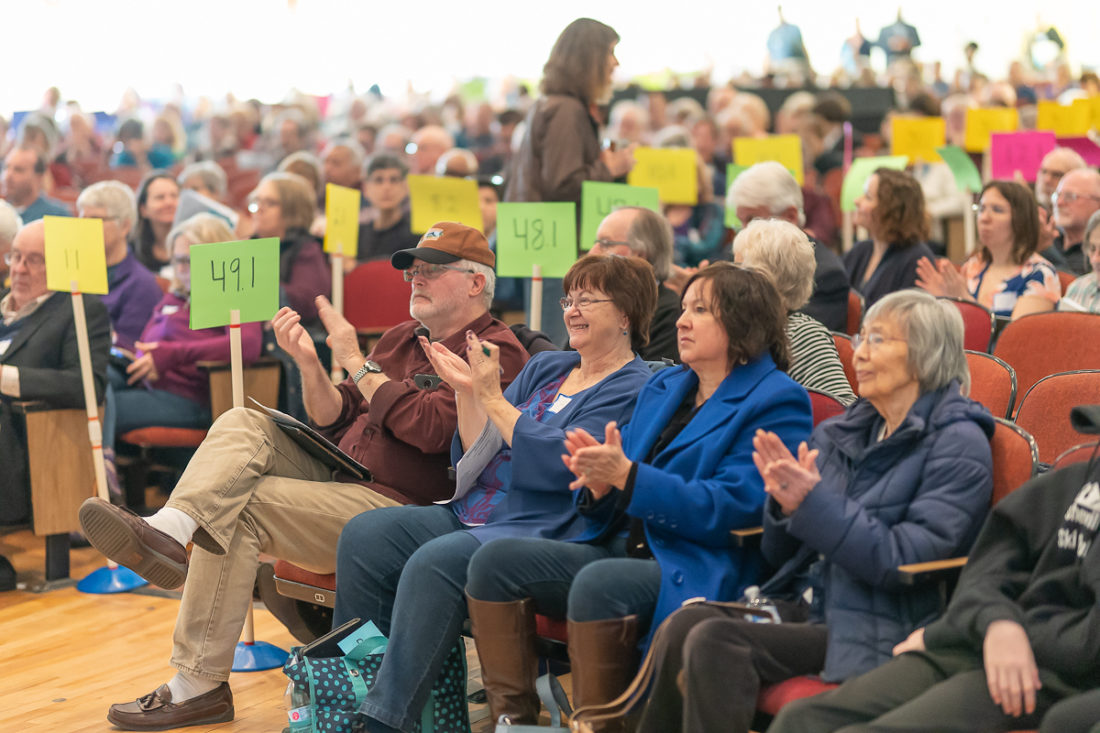With his May 17 visit to the Salvage Station in Asheville, Democratic presidential hopeful Bernie Sanders brought the national race to Western North Carolina more than 17 months before Election Day 2020 — and nearly 28 months after the contest formally kicked off with the Jan. 20, 2017, filing of incumbent Donald Trump. The current field of presidential contenders is exceptional both for the sheer number of announced candidates — at press time, there were 24 major Democrats in the mix, plus former Massachusetts Gov. Bill Weld challenging Trump in the Republican primary — and for how early they’ve launched their campaigns.
Meanwhile, state and local candidates in WNC have also been busy getting their 2020 campaigns underway. State Sen. Terry Van Duyn, a Buncombe County Democrat, announced a run for lieutenant governor on Dec. 10; the last local candidate for that office, Holly Jones, didn’t throw her hat in the ring for the 2016 race until August 2015, eight months later in the election cycle. At the time, Jones was serving on the Buncombe County Board of Commissioners.
Since Van Duyn’s formal statement, a bevy of local contenders have declared their intentions to run for positions ranging from Asheville City Council to the U.S. House of Representatives. It’s an unusually early start to election season, confirms Chris Cooper, head of Western Carolina University’s Political Science and Public Affairs Department — but that shouldn’t come as a surprise.
“I think it’s the continuation of a trend that we’ve seen,” he notes. “We used to talk about presidents and members of Congress having permanent campaigns, meaning they never really stop campaigning, and I think the same thing has now trickled down to the state level.”
Early birds
The drive toward early declarations, says Cooper, is powered largely by the ever increasing cost of mounting a competitive campaign. Even on lower rungs of the political ladder, he suggests, candidates need more money to pay for advertising and voter outreach, and extending the race gives them additional time to raise those funds.
“We’ve seen kind of a professionalization of politics — and I don’t mean that people wear better suits,” Cooper clarifies. “It starts to look more like other industries: You really need to be a professional at a much lower level than you used to. You don’t see as many people running for office on just a flyer as you did before.”
Longer campaigns also give candidates more opportunities to capitalize on opponents’ missteps. Cooper points to the nationally publicized dispute in February between U.S. Rep. Mark Meadows, whose 11th Congressional District covers much of WNC and part of Asheville, and Rep. Rashida Tlaib of Michigan over Meadows’ use of a black Trump administration staffer to counter accusations that the president was racist. Those angered by the move, says Cooper, subsequently donated to Democrat Steve Woodsmall, the only candidate so far who has confirmed his intention to run against Meadows.
An often unmentioned wrinkle in the political landscape, adds Cooper, is candidates’ need to recruit staff from a limited pool of talented, experienced and ideologically aligned workers. Especially during a presidential election cycle, competition for those essential personnel is fierce, and bagging the right managers can make a big difference in a campaign’s prospects for success.
“If you’re Julie Mayfield, and you get your name out there early and decide to run early, you gobble up a lot of the goods,” notes Cooper, referencing the Asheville City Council member’s March 23 announcement that she’ll seek the state Senate District 49 seat that Van Duyn is vacating. “You make it harder for other people to run against you.”
Mayfield doesn’t explicitly mention staffing concerns in explaining her early push for the Senate, but she does say that the timing will enable her “to meet with people, to raise money — all of the things that candidates have to do — before people get really focused, almost exclusively focused, on the national level.”
Domino effect
Both Mayfield and fellow Democrat Ben Scales, a lawyer and recent candidate for Buncombe County district attorney, declared for state Senate District 49 in March. In 2018, Van Duyn’s opponent for the same seat, Republican Mark Crawford, simply made a formal filing in February of that year.
That eagerness, Cooper conjectures, could reflect the recent scarcity in WNC of state-level races that lacked an incumbent. “Frankly, we haven’t had a lot of upward mobility from the western delegation of the N.C. General Assembly,” he points out.
Van Duyn was first elected to the legislature in 2014, after having been appointed earlier that year to serve out the term of the deceased Martin Nesbitt. Fellow Buncombe County Democrats John Ager and Brian Turner (both of whom serve in the N.C. House) also first claimed their seats that year; Rep. Susan Fisher won her place in the General Assembly in 2003.
In contrast, the retirement of Rep. Chuck McGrady at the end of his current term, announced on May 13, has yet to create the same eagerness in Henderson County. No candidate has declared plans to run for the influential Republican’s seat, which he’s held since 2010; McGrady chairs both the Appropriations and Alcoholic Beverage Control committees in the N.C. House.

Meanwhile, Mayfield’s choice to run for state Senate creates an opening on Asheville City Council. Despite the uncertainty surrounding that race due to the General Assembly’s imposition of districts in city elections last June — a change that Mayfield says the city “has not made a final decision on whether to challenge” — Kristen Goldsmith announced her candidacy on May 30 for the District 1 Council seat, which covers most of West Asheville. By setting her sights on higher office, Mayfield, who also lives in West Asheville, has ensured that Goldsmith won’t be running against an incumbent.
“As a first-time candidate, I don’t have the name recognition that maybe an incumbent does, so I knew I’d have to get out early in order to introduce myself to voters,” says Goldsmith, a grocery store assistant manager who was trained as an architect and has worked as a local Democratic organizer since 2016. Her declaration comes nearly eight months earlier in the election cycle than the earliest announcement in the last Council race, Kim Roney’s on Jan. 26, 2017.
Goldsmith says the three most important issues facing Asheville are affordable housing, low wages and public transit, for which she believes Council should increase support by reallocating existing resources. “There is money that can be moved around in there,” she maintains. Asked what current programs would be reduced to pay for transit, she responded, “I don’t want to specifically highlight anything that I want to take money away from, but I want to think more holistically.”
Party people
Almost all of the candidates who have declared their intentions in WNC races so far have been Democrats. Besides those previously mentioned, former state Rep. Patsy Keever and Mills River Town Council member Brian Caskey are challenging Republican Chuck Edwards in state Senate District 48, which covers parts of Buncombe, Henderson and Transylvania counties, while Gina Collias and David Wilson Brown are taking on Republican U.S. Rep. Patrick McHenry in North Carolina’s 10th Congressional District, which includes most of Asheville.
Buncombe County Democratic Party Chair Jeff Rose says this blue wave hasn’t been coordinated by party leaders. Instead, he maintains, candidates are assessing the current political climate and deciding on their own to make early runs.
“Especially when you talk about energy on the Democratic side, there’s a lot of presidential campaigns that are running right now, so there’s a lot to compete with for people’s attention,” Rose points out. “These candidates are looking at it and saying, ‘I really am going to need more time to get my message out to voters, to break through everybody’s individual media bubbles and really make my case.’”
In response to the raft of early announcements, however, the local Democratic organization is making some changes. Rose says party leaders are stepping up volunteer recruitment and fundraising to accumulate resources before the national campaign swings into full force, and the party’s headquarters is preparing office and meeting space for candidates sooner than usual.
Members of Buncombe’s Republican Party have been slower to enter local races. “We realize we’re at a bit of a disadvantage in the city of Asheville, so it takes a little longer for folks to decide if they’re really going to commit,” says Jerry Green, who took over as party chair from Carl Mumpower in March. Green predicts that GOP candidates may start declaring their runs after July or August.
The local party leader says he plans to focus on maintaining the organization’s cohesion through 2020 and an election that he expects to be “a little more aggressive” than the 2018 campaign. Green’s approach, he explains, will be “to educate each other and the general public about what’s going on without being harsh or hateful or ugly to people, but just inform them of what we believe to be the best path to take.”
Notably, one Republican candidate is already looking even further ahead. On March 17, Adrian “AJ” Fox of the Haywood County Sheriff’s Office announced that he will challenge incumbent Democrat Quentin Miller in 2022 to become Buncombe County’s next sheriff. Fox is a former N.C. State Highway Patrol officer and school resource officer for the Buncombe County Sheriff’s Office.
“I announced this early so I could get my name out to the public and get a head start on the election process,” he explains. “I’m going to every public function I can and know about to get my name out there and let voters get to know me, so at election time they will know who they are voting for and will have a face to go with their choice.” On his Facebook campaign page, Fox describes himself as “a proud pro-life, Bible-owning, gun-wielding, Trump-voting, conservative Republican Christian.”
In the long run
With nearly nine months to go before North Carolina’s primary on Super Tuesday (March 3, 2020), state residents face a lengthy season of politics before they can cast their first ballots. Nonetheless, Mayfield says she isn’t worried about voter burnout in her state Senate campaign.
“My sense right now is that people are not fatigued,” she says. “Particularly about local politics, they’re still very much open to meeting and learning and talking and wanting to share their concerns and issues.”
Rose, meanwhile, says that recent abortion restrictions approved by Republican-dominated legislatures in states such as Alabama and Georgia have sparked renewed focus on the importance of both state and local offices. Activism around those races, he says, gives people an outlet for making a real difference.
Cooper, however, is less sanguine about the early announcements’ likely impact on voter engagement. “I think people will grouse about politics more; I think people will be sick of it sooner,” the WCU professor predicts. But on Election Day, he suggests, there probably won’t be any penalty at the ballot box.
Giving campaigns such an early start, says Cooper, “may be bad for democracy, but I don’t think it’s bad for the candidates. I don’t think that it affects [voters’] political behavior and the likelihood that they’ll turn out and vote for you — which is, of course, what candidates care about.”




I believe Patrick McHenry is having a town hall meeting on July 31st at 10 am at the Riceville Community Center and Volunteer Fire Department. I can’t seem to confirm this info, would love to see Xpress confirm, advertise and cover the town hall events for these representatives. If they are having these meetings, they are trying to keep them on the down low and they need to hear from their constituents and be reported on by our local journalists.
Thanks for the tip, Jolene! We have made inquiries to Rep. McHenry’s Washington office and the Buncombe County GOP. We’ll let folks know if we are able to confirm the meeting.